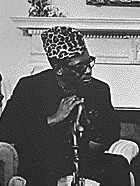Independence struggles
Imperial rule by Europeans would continue until after the conclusion of World War II, when almost all remaining colonial territories gradually obtained formal independence. Independence movements in Africa gained momentum following World War II, which left the major European powers weakened. In 1951, Libya, a former Italian colony, gained independence. In 1956, Tunisia and Morocco won their independence from France.[93] Ghana followed suit the next year (March 1957),[94] becoming the first of the sub-Saharan colonies to be granted independence. Most of the rest of the continent became independent over the next decade.
Portugal’s overseas presence in Sub-Saharan Africa (most notably in Angola, Cape Verde, Mozambique, Guinea-Bissau and São Tomé and Príncipe) lasted from the 16th century to 1975, after the Estado Novo regime was overthrown in a military coup in Lisbon. Rhodesia unilaterally declared independence from the United Kingdom in 1965, under the white minority government of Ian Smith, but was not internationally recognized as an independent state (as Zimbabwe) until 1980, when black nationalists gained power after a bitter guerrilla war. Although South Africa was one of the first African countries to gain independence, the state remained under the control of the country’s white minority through a system of racial segregation known as apartheid until 1994.
Post-colonial Africa

Mobutu Sese Seko, Zaire‘s longtime dictator, embezzled over $5 billion from his country.
Today, Africa contains 54 sovereign countries, most of which have borders that were drawn during the era of European colonialism. Since colonialism, African states have frequently been hampered by instability, corruption, violence, and authoritarianism. The vast majority of African states are republics that operate under some form of the presidential system of rule. However, few of them have been able to sustain democratic governments on a permanent basis, and many have instead cycled through a series of coups, producing military dictatorships.
Great instability was mainly the result of marginalization of ethnic groups, and graft under these leaders. For political gain, many leaders fanned ethnic conflicts, some of which had been exacerbated, or even created, by colonial rule. In many countries, the military was perceived as being the only group that could effectively maintain order, and it ruled many nations in Africa during the 1970s and early 1980s. During the period from the early 1960s to the late 1980s, Africa had more than 70 coups and 13 presidential assassinations. Border and territorial disputes were also common, with the European-imposed borders of many nations being widely contested through armed conflicts.

South African paratroops on a raid in Angola during the South African Border War
Cold War conflicts between the United States and the Soviet Union, as well as the policies of the International Monetary Fund, also played a role in instability. When a country became independent for the first time, it was often expected to align with one of the two superpowers. Many countries in Northern Africa received Soviet military aid, while others in Central and Southern Africa were supported by the United States, France or both.
The 1970s saw an escalation of Cold War intrigues, as newly independent Angola and Mozambique aligned themselves with the Soviet Union, and the West and South Africa sought to contain Soviet influence by supporting friendly regimes or insurgency movements. In Rhodesia, Soviet and Chinese-backed leftist guerrillas of the Zimbabwe Patriotic Front waged a brutal guerrilla war against the country’s white government. There was a major famine in Ethiopia, when hundreds of thousands of people starved. Some claimed that Marxist economic policies made the situation worse.
The most devastating military conflict in modern independent Africa has been the Second Congo War; this conflict and its aftermath has killed an estimated 5.5 million people. Since 2003 there has been an ongoing conflict in Darfur which has become a humanitarian disaster. Another notable tragic event is the 1994 Rwandan genocide in which an estimated 800,000 people were murdered. AIDS in post-colonial Africa has also been a prevalent issue.
In the 21st century, however, the number of armed conflicts in Africa has steadily declined. For instance, the civil war in Angola came to an end in 2002 after nearly 30 years. This coincided with many countries abandoning communist-style command economies and opening up for market reforms. The improved stability and economic reforms have led to a great increase in foreign investment into many African nations, mainly from China, which has spurred quick economic growth in many countries, seemingly ending decades of stagnation and decline. Several African economies are among the world’s fastest growing as of 2016. A significant part of this growth, which is sometimes referred to as Africa Rising, can also be attributed to the facilitated diffusion of information technologies and specifically the mobile telephone. Migration from African nations has increased dramatically in the last decade.


